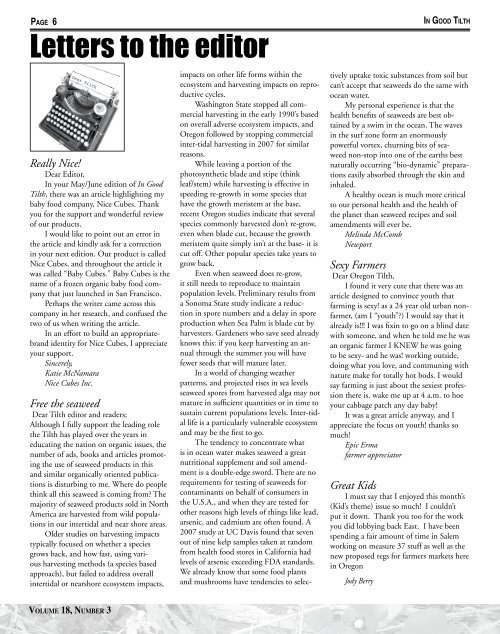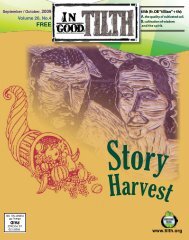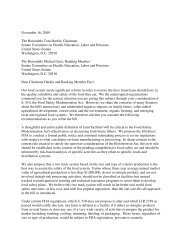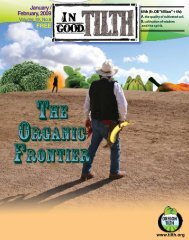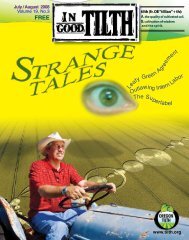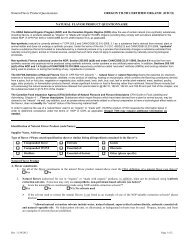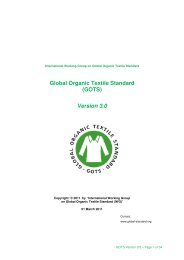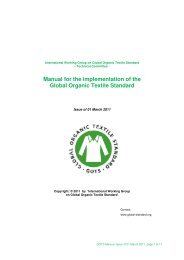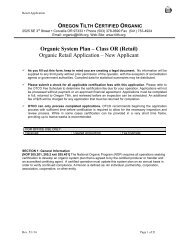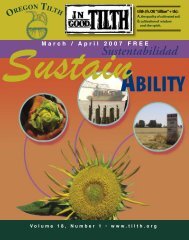Soil progression Soil vitality Soil building Soil testing ... - Oregon Tilth
Soil progression Soil vitality Soil building Soil testing ... - Oregon Tilth
Soil progression Soil vitality Soil building Soil testing ... - Oregon Tilth
Create successful ePaper yourself
Turn your PDF publications into a flip-book with our unique Google optimized e-Paper software.
Page <br />
Letters to the editor<br />
Dear <strong>Tilth</strong><br />
Really Nice!<br />
Dear Editor,<br />
In your May/June edition of In Good<br />
<strong>Tilth</strong>, there was an article highlighting my<br />
baby food company, Nice Cubes. Thank<br />
you for the support and wonderful review<br />
of our products.<br />
I would like to point out an error in<br />
the article and kindly ask for a correction<br />
in your next edition. Our product is called<br />
Nice Cubes, and throughout the article it<br />
was called “Baby Cubes.” Baby Cubes is the<br />
name of a frozen organic baby food company<br />
that just launched in San Francisco.<br />
Perhaps the writer came across this<br />
company in her research, and confused the<br />
two of us when writing the article.<br />
In an effort to build an appropriatebrand<br />
identity for Nice Cubes, I appreciate<br />
your support.<br />
Sincerely,<br />
Katie McNamara<br />
Nice Cubes Inc.<br />
Free the seaweed<br />
Dear <strong>Tilth</strong> editor and readers;<br />
Although I fully support the leading role<br />
the <strong>Tilth</strong> has played over the years in<br />
educating the nation on organic issues, the<br />
number of ads, books and articles promoting<br />
the use of seaweed products in this<br />
and similar organically oriented publications<br />
is disturbing to me. Where do people<br />
think all this seaweed is coming from The<br />
majority of seaweed products sold in North<br />
America are harvested from wild populations<br />
in our intertidal and near shore areas.<br />
Older studies on harvesting impacts<br />
typically focused on whether a species<br />
grows back, and how fast, using various<br />
harvesting methods (a species based<br />
approach), but failed to address overall<br />
intertidal or nearshore ecosystem impacts,<br />
In Good <strong>Tilth</strong><br />
impacts on other life forms within the<br />
ecosystem and harvesting impacts on reproductive<br />
cycles.<br />
Washington State stopped all commercial<br />
harvesting in the early 1990’s based<br />
on overall adverse ecosystem impacts, and<br />
<strong>Oregon</strong> followed by stopping commercial<br />
inter-tidal harvesting in 2007 for similar<br />
reasons.<br />
While leaving a portion of the<br />
photosynthetic blade and stipe (think<br />
leaf/stem) while harvesting is effective in<br />
speeding re-growth in some species that<br />
have the growth meristem at the base,<br />
recent <strong>Oregon</strong> studies indicate that several<br />
species commonly harvested don’t re-grow,<br />
even when blade cut, because the growth<br />
meristem quite simply isn’t at the base- it is<br />
cut off. Other popular species take years to<br />
grow back.<br />
Even when seaweed does re-grow,<br />
it still needs to reproduce to maintain<br />
population levels. Preliminary results from<br />
a Sonoma State study indicate a reduction<br />
in spore numbers and a delay in spore<br />
production when Sea Palm is blade cut by<br />
harvesters. Gardeners who save seed already<br />
knows this: if you keep harvesting an annual<br />
through the summer you will have<br />
fewer seeds that will mature later.<br />
In a world of changing weather<br />
patterns, and projected rises in sea levels<br />
seaweed spores from harvested alga may not<br />
mature in sufficient quantities or in time to<br />
sustain current populations levels. Inter-tidal<br />
life is a particularly vulnerable ecosystem<br />
and may be the first to go.<br />
The tendency to concentrate what<br />
is in ocean water makes seaweed a great<br />
nutritional supplement and soil amendment<br />
is a double-edge sword. There are no<br />
requirements for <strong>testing</strong> of seaweeds for<br />
contaminants on behalf of consumers in<br />
the U.S.A., and when they are tested for<br />
other reasons high levels of things like lead,<br />
arsenic, and cadmium are often found. A<br />
2007 study at UC Davis found that seven<br />
out of nine kelp samples taken at random<br />
from health food stores in California had<br />
levels of arsenic exceeding FDA standards.<br />
We already know that some food plants<br />
and mushrooms have tendencies to selectively<br />
uptake toxic substances from soil but<br />
can’t accept that seaweeds do the same with<br />
ocean water.<br />
My personal experience is that the<br />
health benefits of seaweeds are best obtained<br />
by a swim in the ocean. The waves<br />
in the surf zone form an enormously<br />
powerful vortex, churning bits of seaweed<br />
non-stop into one of the earths best<br />
naturally occurring “bio-dynamic” preparations<br />
easily absorbed through the skin and<br />
inhaled.<br />
A healthy ocean is much more critical<br />
to our personal health and the health of<br />
the planet than seaweed recipes and soil<br />
amendments will ever be.<br />
Melinda McComb<br />
Newport<br />
Sexy Farmers<br />
Dear <strong>Oregon</strong> <strong>Tilth</strong>,<br />
I found it very cute that there was an<br />
article designed to convince youth that<br />
farming is sexy! as a 24 year old urban nonfarmer,<br />
(am I “youth”) I would say that it<br />
already is!!! I was fixin to go on a blind date<br />
with someone, and when he told me he was<br />
an organic farmer I KNEW he was going<br />
to be sexy- and he was! working outside,<br />
doing what you love, and communing with<br />
nature make for totally hot bods. I would<br />
say farming is just about the sexiest profession<br />
there is. wake me up at 4 a.m. to hoe<br />
your cabbage patch any day baby!<br />
It was a great article anyway, and I<br />
appreciate the focus on youth! thanks so<br />
much!<br />
Epic Erma<br />
farmer appreciator<br />
Great Kids<br />
I must say that I enjoyed this month’s<br />
(Kid’s theme) issue so much! I couldn’t<br />
put it down. Thank you too for the work<br />
you did lobbying back East. I have been<br />
spending a fair amount of time in Salem<br />
working on measure 37 stuff as well as the<br />
new proposed regs for farmers markets here<br />
in <strong>Oregon</strong><br />
Jody Berry<br />
Volume 18, Number 3


